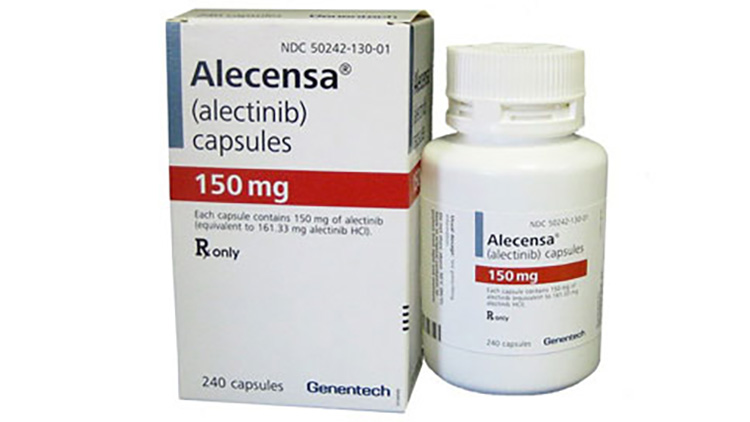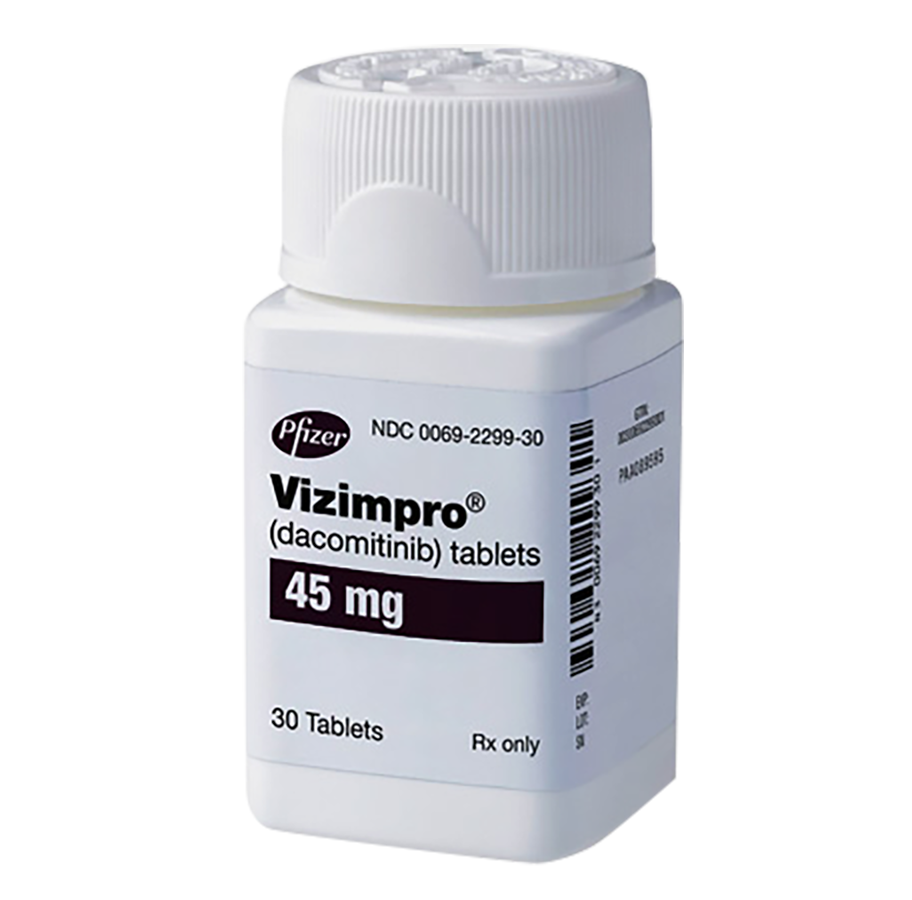Alecensa (alectinib) vs Vizimpro (dacomitinib)
Alecensa (alectinib) vs Vizimpro (dacomitinib)
Alecensa (alectinib) and Vizimpro (dacomitinib) are both oral medications used in the treatment of non-small cell lung cancer (NSCLC), but they target different genetic mutations and have distinct mechanisms of action. Alecensa is specifically indicated for NSCLC patients who have anaplastic lymphoma kinase (ALK) positive mutations and functions by inhibiting the ALK protein, which can promote tumor growth in these patients. On the other hand, Vizimpro is used for the first-line treatment of patients with NSCLC with epidermal growth factor receptor (EGFR) exon 19 deletion or exon 21 L858R substitution mutations and works by inhibiting the activity of the EGFR tyrosine kinase. The choice between these two medications would depend on the patient's specific genetic mutation, as determined by molecular testing, and the patient's overall health, potential side effects, and treatment goals should be discussed with a healthcare provider.
Difference between Alecensa and Vizimpro
| Metric | Alecensa (alectinib) | Vizimpro (dacomitinib) |
|---|---|---|
| Generic name | Alectinib | Dacomitinib |
| Indications | ALK-positive metastatic non-small cell lung cancer (NSCLC) | EGFR-positive metastatic non-small cell lung cancer (NSCLC) with exon 19 deletion or exon 21 L858R substitution mutations |
| Mechanism of action | ALK inhibitor | EGFR inhibitor |
| Brand names | Alecensa | Vizimpro |
| Administrative route | Oral | Oral |
| Side effects | Fatigue, constipation, edema, myalgia, anemia | Diarrhea, rash, paronychia, stomatitis, decreased appetite |
| Contraindications | Hypersensitivity to alectinib or any excipient | Hypersensitivity to dacomitinib or any excipient |
| Drug class | Tyrosine kinase inhibitor | Tyrosine kinase inhibitor |
| Manufacturer | Genentech (a member of the Roche Group) | Pfizer |
Efficacy
Alecensa (Alectinib) Efficacy in Lung Cancer
Alecensa (alectinib) is an oral medication approved by the FDA for the treatment of ALK-positive non-small cell lung cancer (NSCLC). Alectinib specifically targets the anaplastic lymphoma kinase (ALK) genetic mutation, which can drive the growth of cancer cells. Clinical trials have demonstrated that alectinib is effective in slowing the progression of ALK-positive NSCLC. In a pivotal phase III trial known as the ALEX study, alectinib significantly improved progression-free survival (PFS) compared to crizotinib, another ALK inhibitor, in untreated advanced ALK-positive NSCLC patients. The median PFS for patients treated with alectinib was markedly longer, establishing alectinib as a preferred first-line treatment option for this patient population.
Furthermore, alectinib has shown efficacy in patients with central nervous system (CNS) metastases, a common complication in advanced lung cancer. Alectinib's ability to cross the blood-brain barrier allows it to be effective in treating and preventing brain metastases. In clinical studies, patients receiving alectinib had a lower incidence of CNS progression than those receiving crizotinib, indicating a significant benefit for patients with existing or at risk of developing CNS involvement.
Vizimpro (Dacomitinib) Efficacy in Lung Cancer
Vizimpro (dacomitinib) is another oral medication approved for the first-line treatment of patients with metastatic NSCLC with epidermal growth factor receptor (EGFR) exon 19 deletion or exon 21 L858R substitution mutations. Dacomitinib is an EGFR tyrosine kinase inhibitor that blocks the activity of EGFR mutations that can promote the growth of cancer cells. In a phase III clinical trial known as the ARCHER 1050 study, dacomitinib demonstrated superior efficacy in terms of PFS when compared to gefitinib, another EGFR inhibitor, in the first-line treatment of patients with NSCLC harboring these specific EGFR mutations. The median PFS for patients treated with dacomitinib was significantly longer than for those treated with gefitinib, suggesting a strong benefit for patients who are eligible for this targeted therapy.
Additionally, dacomitinib has shown a modest improvement in overall survival (OS) compared to gefitinib, which is an important consideration for patients and healthcare providers when selecting a treatment regimen. However, the increased efficacy comes with a higher incidence of adverse events, which must be carefully managed. Despite this, for patients with EGFR-mutated NSCLC, dacomitinib offers a valuable treatment option that can lead to improved outcomes.
Regulatory Agency Approvals
Alecensa
-
European Medical Agency (EMA), European Union

-
Food and Drug Administration (FDA), USA

-
Health Canada

-
Pharmaceuticals and Medical Devices Agency (PMDA), Japan

-
Therapeutic Goods Administration (TGA), Australia

-
Medsafe (NZ)

Vizimpro
-
European Medical Agency (EMA), European Union

-
Food and Drug Administration (FDA), USA

Access Alecensa or Vizimpro today
If Alecensa or Vizimpro are not approved or available in your country (e.g. due to supply issues), you can access them via Everyone.org.
How it works

Make an enquiry
Choose the medicine you want to buy, answer a couple of questions, and upload your prescription to speed things up. We’ll get back to you within 24 hours.


Make an enquiry
Choose the medicine you want to buy, answer a couple of questions, and upload your prescription to speed things up. We’ll get back to you within 24 hours.


Breeze through the paperwork
We'll guide you through the required documents for importing unapproved medicine, ensuring you have all the necessary information.


Get a personalized quote
We’ll prepare a quote for you, including medicine costs and any shipping, administrative, or import fees that may apply.


Receive your medicine
Accept the quote and we’ll handle the rest - sourcing and safely delivering your medicine.

Some text on this page has been automatically generated. Speak to your physician before you start a new treatment or medication.
Let's talk
If you have any questions, call us or send us a message through WhatsApp or email:
Contact us




